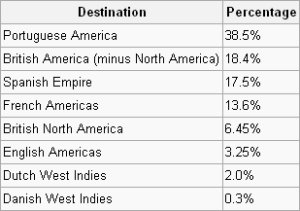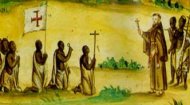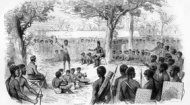|
African Slavery | African Slavery | African Slavery | African Slavery |
|
 A chart showing the % of Africans taken into slavery per location in the Americas. |

|
Although 1510CE saw the first African salves shipped to South America via Spain, it was 1518CE that the direct transportation of slaves to America itself started in earnest, peaking in the 1790s. During those centuries, millions of Africans were forcibly removed from their homes, packed onto disease-ridden ships, and endured the horrific Middle Passage to the Americas. The scale of African slavery was unprecedented, with an estimated 12-15,000,000 Africans taken into slavery ready to be transported mainly to America but also to North Africa and the Middle East although historians calculate that around half of this number may actually have died before they even reached the coast of Africa in readiness to sail from ports established by European traders, often in partnership with African intermediaries and rulers. These African leaders, in exchange for European goods like firearms, textiles, and alcohol, participated in the capture and sale of people, often from rival ethnic groups. This complex dynamic underscores that while European demand created the market, indigenous political structures played a role in facilitating the trade, albeit under immense pressure and often through the exacerbation of pre-existing rivalries. The impact of this forced migration on Africa was devastating and multifaceted. Demographically, the continent lost generations of its most productive young men and women, hindering population growth and development. It is now estimated that the population of Africa in 1850, of 25,000,000, would actually have been twice that number had the captured slaves not been taken and had procreated as per the societal norm. Economically, the slave trade diverted resources and energy away from productive internal activities towards warfare and the capture of people. It disrupted traditional economies, fostering a destructive dependence on European manufactured goods, and preventing the development of local industries. Politically, the trade fueled internal conflicts, destabilised states, and contributed to the rise and fall of various empires. Communities were shattered, trust eroded, and ethnic divisions deepened, leaving a legacy of political fragmentation and vulnerability that would later be exploited during the colonial era. For the destination nations in the Americas, the influx of enslaved African labour built immense wealth and profoundly shaped their societies. Plantations flourished, driving economic growth in European colonial powers. However, this prosperity came at the cost of unimaginable human suffering and the institutionalisation of deeply entrenched racial hierarchies. Enslaved Africans and their descendants made invaluable, though often unacknowledged, contributions to the agriculture, infrastructure, and culture of the New World. Their diverse languages, religions, music, and culinary traditions blended to form the rich tapestry of Afro-diasporic cultures, even as they endured systemic oppression. The tide began to turn in the late 18th and early 19th centuries, driven by a growing moral opposition, Enlightenment ideals, and the tireless efforts of abolitionist movements. Religious groups, intellectual reformers, and former enslaved people themselves, like Olaudah Equiano, spoke out against the inherent injustice of slavery. Slave rebellions, most notably the Haitian Revolution, which led to the creation of the first free black republic in 1804, demonstrated the fierce resistance of the enslaved and pressured colonial powers. Economic shifts, as industrialisation began to challenge the profitability of slave-based agriculture, also played a role. Britain abolished the slave trade in 1807 and slavery throughout its empire in 1833. The United States followed suit with the 13th Amendment in 1865, though pockets of legal enslavement persisted in other parts of the world into the late 19th century and beyond. The long-term impact of African slavery continues to resonate profoundly in Africa and the African diaspora today. In Africa, the historical trauma of the slave trade is linked to persistent underdevelopment, weak state institutions, and ongoing ethnic tensions. The demographic void and economic disruption created by centuries of exploitation hindered Africa's ability to industrialise and prosper. The patterns of extraction and dependency established during the slave trade laid the groundwork for later colonial exploitation. Within the diaspora, the legacy of racial prejudice, systemic inequality, and socioeconomic disparities rooted in slavery continues to affect communities. Issues of identity, historical memory, and the ongoing struggle for racial justice are direct consequences of this brutal past. The short video documentary above explores the development of black African slavery and how, until 1640 the Portuguese had a near monopoly of the African slave trade. Until the abolition of the practice, it is estimated that Portugal was responsible for the transportation of 4.5 million slaves, approximately 40% of the total. |







